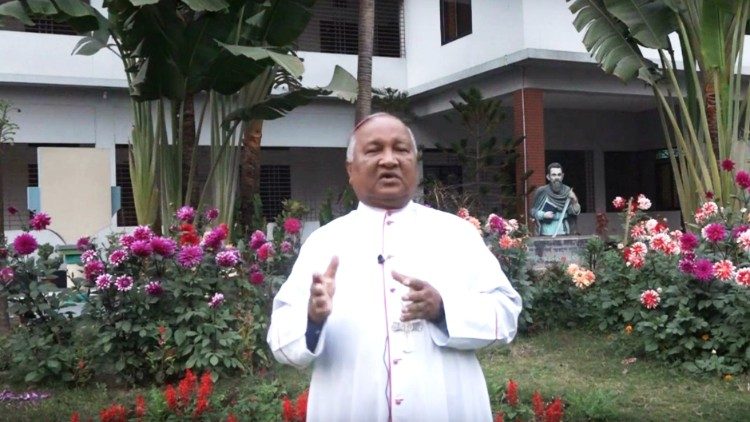Bishop Rozario urges the government to lift the curfew
The bishop of Rajshahi, president of the Justice and Peace Commission of the Catholic Bishops' Conference of Bangladesh, spoke to AsiaNews, calling for an end to the curfew that shut down the country, harming the poor above all. Those killed deserve justice, but order must be maintained. While Dhaka has been trying to get back to normal this morning, the death toll has risen to at least 197. Students say that some of their leaders are missing following the wave of arrests. The government blames the opposition and foreign "accomplices".
Dhaka (AsiaNews) – Bishop Gervas Rozario of Rajshahi calls on the government to lift the curfew imposed on the country after recent protests over public employment quotas led to widespread unrest.
“Due to the curfew, the income of needy people has been stopped. I ask the Bangladesh government to discontinue curfew,” said Rozario speaking to AsiaNews.
“The students started the movement, but later it became a political issue. As per government statement, opposition political leaders tried to make this government fall by creating unrest and violence,” he added.
For Bishop Rozario, who is vice president of the Catholic Bishops' Conference of Bangladesh and president of the Episcopal Commission for Justice and Peace, “It seems now the situation is almost under control; the curfew should be stopped for needy people.”
The prelate wants justice for those killed and wounded, but also appropriate action to control the disorder. Meanwhile, after five days, the situation across the country seems to be getting back to normal this morning.
With the easing of the curfew, offices, courts, and banks have reopened, while cars and other vehicles are back on the roads and highways. As of yesterday evening, limited internet access is available in some areas.
The death toll from violence now stands at 197 people, while over 2,000 people have been wounded, including students, political activists, journalists, and ordinary people.
Several public and private buildings have been vandalised or set on fire, including the metro rail, the expressway, a BTV building, bridge construction sites, and disaster management facilities. Many public and private vehicles, including buses and lorries, have been destroyed.
In Dhaka, police filed 61 lawsuits against 90,000 people. Some 2,000 arrest warrants have been issued, including some against opposition leaders.
Fr Tushar James Gomes, assistant secretary general of the Catholic Bishops' Conference of Bangladesh, told AsiaNews that no church buildings or structures were attacked or damaged.
On Sunday, the Appellate Division overturned the High Court's ruling on quotas in public employment and ordered the lowering of the reserved quotas to 7 per cent: 5 per cent for the children and descendants of the heroes of the 1971 War of Liberation, 1 per cent for national minorities, and 1 per cent for people with disabilities and members of the "third gender".
Under the new system, quotas for women and underdeveloped districts have been eliminated. Until 2018, up to 56 per cent of government jobs were reserved: 30 per cent for the children and grandchildren of freedom fighters, 10 per cent for women, 10 per cent for residents of underdeveloped districts, 5 per cent for members of national minorities, and 1 per cent for the physically disabled.
Justice Minister Anisul Huq said that the government will implement the court ruling.
Coordinators of the anti-discrimination student movement held a press conference yesterday at the Dhaka Reporters Unity (DRU) auditorium with a large deployment of police across the street.
They reiterated their four demands: the restoration of internet access and the lifting of the curfew, police pullout of university campuses, a safe return for students, and finally, guarantees for the movement’s coordinators.
One of the leaders, Sarjis Alam, blamed the government's attitude towards the quota reform movement for the situation. He said the damage inflicted on many families was irreparable.
At the press conference, it was announced that Asif Mahmud, one of the coordinators, along with Abu Bakr Majumdar, and Rifat Rashid, have been missing since July 18.
For his part, Foreign Minister Hasan Mahmud blamed Nobel Peace Prize winner Muhammad Yunus, accusing him of treason for calling on the international community to intervene on quota reform.
Mahmud also criticised the statements of the Chief Minister of the Indian state of West Bengal, Mamata Banerjee, saying that sites of destruction and arson will be shown to diplomats.
The Bangladeshi government also claims to have identified those who funded the protests through payments from abroad.
The one certain thing is that the poorest are paying for the country’s crisis. In light of this, Prime Minister Sheikh Hasina has asked supporters of her Awami League to help those most in need.
07/02/2019 17:28
24/08/2007
18/06/2020 17:09







.png)










